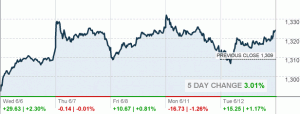In the strange world of investment management, bad news is often good news.
That was the case last week, as the S&P 500 gained a hefty 3.7%, more than reversing its 3% loss from the previous week.
The market rose 2.3% on Wednesday alone – its largest single-session percentage gain so far this year – amid signs that the already tepid economic recovery is slowing further.
So why did the market rally? Because traders speculated that the Federal Reserve will react to the slowing economy with additional stimulus.
Fed Chairman Ben Bernanke didn’t even hint at any immediate plans for a third round of quantitative easing or any other steps to stimulate the economy. The European Central Bank (ECB), likewise, left its benchmark interest rate at 1.00%. However, ECB President Mario Draghi said that actions would be taken if needed.
So the chance that another round of stimulus may take place is enough to boost the market 3%.
Given that economic growth remains anemic and the unemployment rate is at 8.3% and is generally creeping up, not down, previous rounds of stimulus have had virtually no long-term impact.
Short-term, though, markets love quantitative easing, which makes investments in stocks appear desirable by making investments in other assets undesirable.
So if quantitative easing doesn’t help the economy and provides only a short-term boost to stock prices, maybe the Fed should just float a few rumors … plan a faux round of quantitative easing to give the markets a boost without any cost or harm to the economy.
The Pain in Spain, Part 2
Spain added to the good-bad news last week, as Fitch downgraded Spain’s debt rating from A to BBB after the country held a successful debt auction.
A teleconference last week between G-7 finance ministers to discuss Spain’s banking system, along with other Eurozone problems, failed to yield any specific plan for addressing the crises, and Fitch followed up yesterday by dropping ratings on two major Spanish banks, Banco Santander S.A. (STD, SAN.MC) and Banco Bilbao Vizcaya Argentaria S.A. (BBVA, BBVA.MC).
The downgrades, from A to BBB, came in spite of a weekend agreement by the Spanish government to a European Union bailout of up to EUR100 billion, or about $125 billion.
Spain joins Greece, Portugal and Ireland in the growing list of bailees. Soccer anyone?

